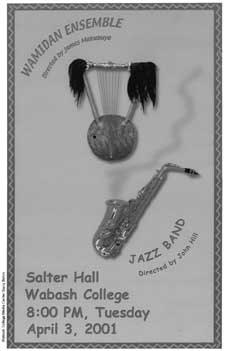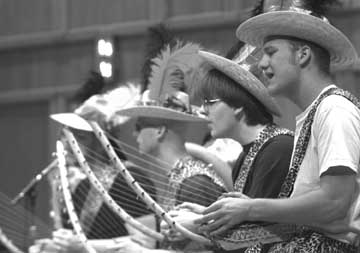
"If you play that way,
the audience will come up
on the stage and kill us."
Professor James Makubuya,
at the final dress rehearsal of the College's
first world music ensemble
Read more about WAMIDAN and the other Wabash Music Ensembles
Read more about Professor Makubuya
by selecting faculty at the Wabash
Music Department site.
"No one wants to watch you be miserable and struggle. Even if you are scared to death, you must smile. Otherwise, the audience will just shake their heads and pray that you disappear."

Maroof was smiling, oblivious of how it was going to
feel to bomb in front of 300 people.
I knew the feeling all too well: the twist in the gut, the people in the front row staring at their feet, the steady acceleration of the music as the players scramble to put yet another musical beast out of its misery.
Magazine
Summer/Fall 2001
Making a
Spectacle of Ourselves

by Steve Charles
"No Previous Musical Experience Necessary."
When world music professor James Makubuya added that line to his call-out
for the College's first African music ensemble, the former conductor of
the National Choir of Uganda and master of that country's folk instruments
couldn't have realized what he was opening himself up to. Or maybe there
was a method to his madness.
You couldn't have convinced me there was any method at all as stumbled
through the final rehearsal for our first performance. I knew the axiom,
"bad rehearsal, good performance," but I'd assumed that the
players were at least supposed to know how to play their instruments.
In less than a week, Wamidan (Wabash African Music Instrumentalists and
Dancers) would debut at the venerable Christmas Festival of Music and
Readings. From all I could see, we were about to prove that corn-fed Hoosier
boys can't play African music if their lives depend on it.
Actually, we were a diverse group: five freshmen-three from towns in
Indiana, one from Seattle, one from Bangladesh; two who had been discouraged
from ever attempting anything musical; and three middle-aged College staffers.
Brian McAfferty of the library faculty brought a stabilizing presence,
solid rhythm, and instrumental experience, and Diane Norton offered her
superb musicianship and aesthetic.
I was there to experience first-hand the sacrifice students make to be
a part of the College's extracurricular ensembles and to learn from a
master how to play and perform another continent's folk music. Makubuya
promised we'd learn to improvise, a skill that had escaped me for twenty
years playing old-time music on guitar and dulcimer.
As a group, we shared a sense of humor, hectic schedules, and, until
rehearsals began, complete ignorance of the instruments we were to play
for this performance.
We'd expected to play drums. Much as the British soldiers who encountered
Makubuya's Baganda people 200 years ago, we thought that's what most African
folk musicians played. Those soldiers had been astonished to find not
a primitive culture, but elaborate houses, a complex society, and beautiful
music played on harps (adungos), lyres (ndongos), and small xylophones
(madindi). We were equally astonished when the professor told us we'd
be performing publicly on two of these instruments by the end of the year.
We were stunned when he confidently announced our concert schedule.
Not that we weren't being well-equipped. Makubuya is an awe-inspiring
player. In hiring him, the College has given students the rare opportunity
to study with an internationally recognized master musician. He's also
an incredible teacher, challenging but patient, rewarding successful riffs
with an enthusiastic "Wow, that is excellent. Give me five!"
Meeting with each ensemble member once a week for private lessons and
with the group each, his dedication and charisma made us want to be good
at this.
But having the will to doesn't give you the skills. Those were in short
supply as we bumbled through a Swahili carol that required us to sing,
accompany ourselves on adungos, and to look like we were enjoying our
ineptitude.
"You will do great!" Makubuya encouraged. He schooled us in
performance technique. He taught us how to pronouce the Swahili words,
what they meant and their cultural significance.
"African music is a spectacle—be joyful. Celebrate with the music," he admonished.
It was the steepest part of the learning curb for our midwestern sensibilities.
"Playing music" is often an oxymoron in the concert hall. We
dress in black, wear serious expressions, and try to prove our worth with
every note. Playing gleefully through mistakes, risking loss of concentration
by moving joyfully to the music, and making a gift of the performance
despite our lack of confidence-that was lot to ask of 18-year-old males
and a couple middle-aged folkies. But to James, playing without joy was
worse than missing a note or forgetting the lyrics.
"No one wants to watch you be miserable and struggle. If you make a mistake, smile. If you make a big mistake, smile bigger," he pleaded in his regal Ugandan accent. "Even if you are scared to death, you must smile. Otherwise, the audience will just shake their heads and pray that you disappear."
When the group could not oblige that request, Makubuya videotaped a rehearsal
and made us watch it, laughing along with us at the sullen, stiff musicians
who looked as if they wanted to crawl into their instruments to hide.
"If you play that way, the audience will come up on the stage and
kill us," he joked. I found the notion troublingly plausible.
At the final rehearsal, we still weren't ready. The group requested additional
practices—three of them. It was almost final exam week, but the students
were adamant about the extra run-throughs.
"I never insist on additional rehearsals," Makubuya told me
later. "I want that to come from the group. It needs to be their
determination that drives this, not mine."
But as long as we wanted to rehearse, the professor was there.
"We will play, and we will play together. The audience will not
believe what they are hearing," he enthused. He certainly had that
last part right.
We did improve a little at each practice, getting to know each other's
quirks in the process. The two freshmen new to music approached the tunes
with similar zeal but entirely different methods. Joe Warful, the only
freshman on the College's "Brain Bowl" team and a Hoosier with
an inordinate love of all the things Canadian, spent hours on the harp
developing the most rapid dexterity in the group. "Canada,"
as we tagged him, often stood at the lip of the stage when we practiced
to the point Makubuya thought he would fall off. We called it "playingon
the edge."
His fellow neophtye, Maroof Kahn, a Bangladeshi physics and math wiz
with a winning smile, developed an elaborate tablature system just o learn
the songs.
Jason Hatfield '04 is a bass player with natural talent and a class clown
with deadpan delivery. One of his African instruments was adorned with
goat hair, which Jason would spread over his scalp as he smiled like the
Mona Lisa.
Chris Borm '04 is a seasoned performer with a wonderful voice we depended
on to lead the vocals, and Kevin Kinsey '04 is a trombonist who could
express his pleasure in playing in way that pulled the group out of its
self-consciousness. As long as Kevin was grooving during a song, we knew
everything was alright.
Rehearsals became that blend frustration, concentration, laughter, and
accomplishment that may be the greatest reward of ensemble work. The rapport
within the group was outstripping our musical ability, but at least we'd
die a team.
The Christmas Festival of Music and Readings came before I could come
up with a good excuse to be out of town. We spent an hour tuning our adungos
and rushed through a disheartening sound check. Then, after a Bible reading
and a beautiful sacred number by the Glee Club, we lugged our drums and
adungos onto the stage, wearing outfits that made us look like high-church
acolytes teamed with African pirate cowboys.
It was time to put all that practice on the line. I looked across at
Canada and Maroof, wondering how they felt at this, their first, and possibly
last, musical performance.
Joe's eyes were fixed on his harp strings.
Maroof was smiling, oblivious of how it was going to feel to bomb in
front of 300 people.
I knew the feeling all too well: the twist in the gut, the people in the front row staring at their feet, the steady acceleration of the music as the players scramble to put yet another musical beast out of its misery.
Feeling the sweat breaking out and my fingers beginning to shake, I turned
to James for the count. He looked calm, with a serene smile on his face.
He was either preparing for death or he knew some of that African "ju-ju"
he told me about would magically protect us.
Maybe it did. As we launched into the carol, Brian, Kevin, and Diane
began swaying in unison to the music. The harps were in tune! There was
a strong melody to our singing, harmony from the instruments, and even
a semblance of rhythm!
Then we tossed out the ace up our sleeves. MXI Director Horace Turner
had recruited three girls from Tuttle Middle School to whom Makubuya taught
a traditional African dance of praise. As we finished the first section
of our song, James began his powerful drumming, and these young dancers
stepped onto the stage, innocent and beautiful in their costumes, moving
with the grace, pride, and confidence of queens.
We strummed and sang together with pleasure and abandon, plenty of mistakes
but plenty of smiles, and the chapel walls echoed with a joyful African
noise that had never resonated there before. I looked down the line of
our fledgling ensemble-a little goofy, but certainly into the music. And,
thanks to Makubuya's drumming, sounding downright exotic.
We ended with a crescendo. The dancers raised their rattles high above
their heads, we bowed, and the audience offered a warm ovation to the
dancers and their band-our Wabash African music band.
Any worries I had that the Wabash community might not support this new
ensemble vanished as applause raised smiles on our students' faces and
would inspire them for the rest of the year. It was a promising start.
But my favorite moment of the year came four months later, after the
ensemble's ambitious concert with the Wabash Jazz Band in April. As the
we left the audience's applause behind, I noticed Makubuya shaking hands
with Maroof. Only weeks earlier at a particularly frustrating practice
session, the freshman had protested when the professor referred to him
as a musician.
"I cannot do this," Maroof had said. "I'm just not a musician."
But as Jazz Band members patted him on the back while they as they stepped
onstage, Maroof changed his mind.
"So, how do you feel?" the professor asked.
"I feel like a musician," the freshman exulted.
"You are a musician," Makubuya smiled. "Believe it."
This fall, Maroof, Kevin, Jason, and Canada return as part of Wamidan
to bring this new, old music to the College. Makubuya hopes to take the
ensemble to the larger Crawfordsville community and schools, to explore
with the town's dance schools the roots of the jazz dancing so in vogue
with school kids here. And again he'll offer students with "no previous
musical experience" the opportunity to embrace the challenge and
joy of playing music and joyfully bringing it to others.
I also hear that, this year, the men are going to dance.
Method to his madness? I'm already making plane reservations.
Return to the table of contents

